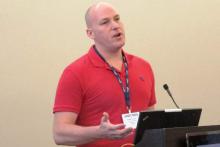WASHINGTON – Exercise can have significant and clinically important mental health benefits for both cancer patients and their caregivers, investigators report.
Among patients with cancer and depression, those who took part in a home-based exercise program had the most rapid improvement of depressive symptoms, whereas patients enrolled in a supervised, structured exercise program had the longest-lasting benefits. Both groups had better resolution of depression than did controls, reported Dr. Gregory T. Levin, an accredited exercise physiologist and postdoctoral research fellow at the University of Calgary (Alta.).
Exercise should be considered as a component of precision medicine, where we can tailor an exercise intervention for a person depending on their mental health status, their cancer status, or the outcomes that we’re trying to attain, whether that’s [creating] changes in depression or improving muscle strength and muscle function,” Dr. Levin said at the joint congress of the International Psycho-Oncology Society and the American Psychosocial Oncology Society.
Dr. Levin and his colleagues conducted a study to determine whether certain types of exercise programs might be more effective than others at reducing symptoms of depression in cancer survivors, compared with controls.
They first screened the participants to ensure that only cancer patients with established clinical depression or elevated depressive symptoms would be invited to take part. Patients were eligible if they reported that they were currently being treated for depression, if they scored more than 10 on the Hospital Anxiety and Depression Scale (HADS), or if they met diagnostic criteria according to the Diagnostic and Statistical Manual of Mental Disorders, Fourth Edition, Text Revision (DSM-IV-TR) self-rating scale for depression.
They enrolled 32 participants with a mean age of 58.9 years to either a 12-week, clinic-based supervised exercise program (10 patients), a home-based exercise program (8), or usual care (14).
Patients in the supervised exercise group had two weekly sessions of resistance and aerobic training. Patients in the home-based group were given printed material and asked to keep an exercise diary, and were encouraged to exercise at least 150 minutes each week. These patients also received a weekly follow-up phone call. Controls were not told to exercise but were encouraged to maintain usual activities, did not receive printed material, and were not contacted regarding exercise.
For the primary endpoint of depression, both the home-based intervention and the supervised exercise groups had significant reductions in mean HADS scores after 12 weeks, from a baseline of 6.4 to 2.2 for the home-based group (P = .006), and from 6.9 to 2.4 for the supervised group (P = .021). In contrast, controls had a slight increase in scores, from a mean of 7.22 at baseline to 7.76 at week 12.
The most rapid change occurred among the home-based exercisers, who saw the greatest gain during the first 6 weeks. During the second 6 weeks, however, the supervised exercisers saw a sharper decline in scores, compared with the other two groups, possibly because of a loss of motivation among the home-based group.
There was no interaction effect for anxiety over the 12 weeks, but the pattern of decline in anxiety was similar to that seen with depression, with home-based exercisers having a steep decline over the first 6 weeks of the program and then plateauing, while the supervised exercisers saw a greater drop in anxiety scores over the second 6-week period.
Mental health questionnaire scores also favored the exercise groups, compared with controls.
“The exercise program was able to alleviate the depressive symptoms, but the rate of change differed. The home-based [exercise program] initially was favored, and that might be largely due to psychological reasons of distraction, self-efficacy, and mastery, where those self-managed patients take on an exercise regime, are proud of themselves for sticking to it, and notice rapid changes. But then it might become boring and they might stop any time they don’t see changes of such high magnitude,” Dr. Levin said.
Caregiver study
The effects of exercise on the psychological well-being of caregivers was the focus of a scientific poster by Dr. Sylvie Lambert and her colleagues from McGill University in Montreal and the Princess Margaret Cancer Centre in Toronto.
They conducted a systematic review of 14 studies evaluating the effects of exercise and specific types of physical activity on caregivers’ psychosocial well-being. The studies looked at caregivers of patients with cancer and other chronic diseases or disabilities.
They found that overall, exercise has significant beneficial effects on decreasing depression, burden, stress, anger, and anxiety. Most of the interventions used a combination of physical activities, including walking, yoga, meditation, aerobics, tai chi, strength training, stretching, and daily activities such as gardening, housework, etc.



